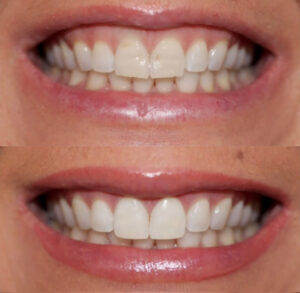Inlays and Onlays are a more conservative way of restoring normal tooth structure after decay or other damage. Inlays and onlays are known as indirect fillings because unlike a standard filling because the procedure is performed in the dentist’s office, both are made in a laboratory and cemented or bonded to the surface of the tooth during a second visit. Unlike standard fillings, inlays and onlays do not weaken the tooth structure, but actually strengthens the tooth / teeth. An inlay is performed when the tooth structure replaced is within the cusp tips of the tooth. If the damage is more extensive and the new structure covers the entire chewing surface including one or more tooth cusps, this procedure is called an onlay.
- Dental Onlays and Inlays are indirect fillings made out of the mouth and bonded onto the tooth
- Onlay and Inlays strengthens teeth and provides an attractive cosmetic finish that is less likely to stain over time
- Inlays and onlays are durable, long-lasting, and require no greater level of care than any other tooth
- Less expensive than dental crowns
- Natural looking and color matched
- Designed using advanced E4D technology
- Can be fabricated in a single appointment
- Made from resilient materials
- Long lasting restorations
Dental Inlays and Dental Onlays are restorative dentistry procedures t to repair teeth that have mild to moderate tooth decay. Inlays and Onlays can also be used to restore teeth that have minor fractures or cracks. However, if the damage to the tooth / teeth is extreme, a dental crown is oftentimes recommended. Inlays and Onlays are usually made from porcelain, composite resin and sometimes gold are used if elected by the dental patient.
I’ve gone from nervous moth to confident butterfly! Thank you Dr. Pia for my amazing new smile. ~ Google
What’s the Difference between a Cosmetic Inlay and Onlay?
Cosmetic inlays and onlays are indeed quite similar. The difference between the two is simple: the placement and the amount of coverage given. Inlays are only used on the biting surface of the tooth (the “cusps”). The cusps are the structures on the top of the back teeth used for chewing. An Onlay, on the other hand, are a more extensive restorative dentistry procedure and used when tooth / teeth damage extends beyond one or more cusps. Onlays are oftentimes referred to as partial crowns.
- An Inlay covers only one or two surfaces of the tooth, and is used to restore a smaller amount of decay.
- An Onlay covers one or more cusps (the chewing surfaces of the tooth), and offers greater protection for moderately fractured or decayed teeth.


























